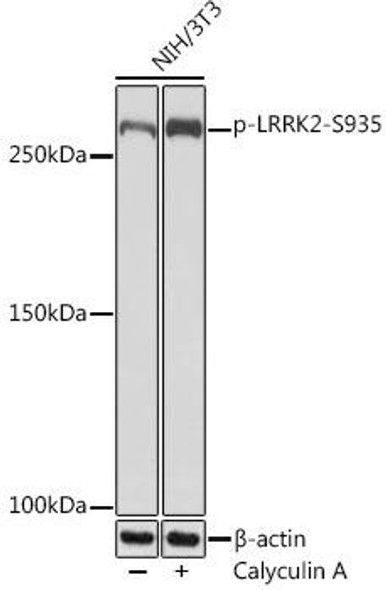Description
Anti-Phospho-BTK-Y223 Antibody (CABP1136)
The Phospho-BTK (Y223) Rabbit Monoclonal Antibody (CABP1136) is a cutting-edge tool for studying the activity of Bruton's tyrosine kinase (BTK), a key enzyme in B-cell receptor signaling. This antibody, developed from rabbit monoclonal cells, exhibits high specificity and sensitivity towards phosphorylated BTK at the Y223 site.BTK is a critical factor in B-cell development and function, making it a significant target for research in immunology and cancer biology. Phosphorylation of BTK at the Y223 site is known to regulate its kinase activity and downstream signaling pathways, making this antibody essential for investigating the functional implications of BTK phosphorylation in various cellular contexts.
Validated for use in applications such as Western blotting, immunofluorescence, and immunoprecipitation, the Phospho-BTK (Y223) Rabbit Monoclonal Antibody (CABP1136) enables precise detection and analysis of phosphorylated BTK in cell lysates and tissue samples. Its versatility and high performance make it an indispensable tool for researchers studying B-cell signaling, immune responses, and potential therapeutic targets for BTK-related diseases.
| Antibody Name: | Anti-Phospho-BTK-Y223 Antibody |
| Antibody SKU: | CABP1136 |
| Antibody Size: | 20uL, 50uL, 100uL |
| Application: | WB |
| Reactivity: | Human, Mouse, Rat |
| Host Species: | Rabbit |
| Immunogen: | A phospho specific peptide corresponding to residues surrounding Y223 of human BTK |
| Application: | WB |
| Recommended Dilution: | WB 1:500 - 1:2000 |
| Reactivity: | Human, Mouse, Rat |
| Positive Samples: |
| Immunogen: | A phospho specific peptide corresponding to residues surrounding Y223 of human BTK |
| Purification Method: | Affinity purification |
| Storage Buffer: | Store at -20°C. Avoid freeze / thaw cycles. Buffer: PBS with 0.02% sodium azide, 0.05% BSA, 50% glycerol, pH7.3. |
| Isotype: | IgG |
| Sequence: | Email for sequence |
| Gene ID: | 695 |
| Uniprot: | Q06187 |
| Cellular Location: | |
| Calculated MW: | 76kDa |
| Observed MW: |
| Synonyms: | AGMX1, AT, ATK, BPK, IMD1, PSCTK1, XLA |
| Background: | The protein encoded by this gene plays a crucial role in B-cell development. Mutations in this gene cause X-linked agammaglobulinemia type 1, which is an immunodeficiency characterized by the failure to produce mature B lymphocytes, and associated with a failure of Ig heavy chain rearrangement. Alternative splicing results in multiple transcript variants encoding different isoforms. [provided by RefSeq, Dec 2013] |
| UniProt Protein Function: | Btk: a tyrosine kinase of the Tec family. Plays a crucial role in B-cell ontogeny. Defects cause X-linked agammaglobulinemia, an immunodeficiency characterized by failure to produce mature B lymphocyte cells and associated with a failure of Ig heavy chain rearrangement. Truncated splice forms found in childhood leukemias may underlie radiation resistance of tumors through inhibition of apoptosis. |
| UniProt Protein Details: | Protein type:Kinase, protein; Protein kinase, TK; EC 2.7.10.2; Protein kinase, tyrosine (non-receptor); TK group; Tec family Cellular Component: cytoplasm; cytoplasmic vesicle; cytosol; extrinsic to internal side of plasma membrane; intracellular membrane-bound organelle; lipid raft; mast cell granule; membrane; nucleus; perinuclear region of cytoplasm; plasma membrane Molecular Function:ATP binding; identical protein binding; kinase activity; lipid binding; metal ion binding; non-membrane spanning protein tyrosine kinase activity; nucleotide binding; phosphatidylinositol-3,4,5-triphosphate binding; protein binding; protein kinase activity; protein-tyrosine kinase activity; transferase activity Biological Process: adaptive immune response; apoptosis; cell maturation; histamine secretion by mast cell; I-kappaB kinase/NF-kappaB cascade; immune system process; innate immune response; negative regulation of cytokine production; peptidyl-tyrosine phosphorylation; phosphorylation; protein amino acid autophosphorylation; protein amino acid phosphorylation; regulation of cell proliferation; regulation of transcription, DNA-dependent; response to organic substance; transcription, DNA-dependent; transmembrane receptor protein tyrosine kinase signaling pathway |
| NCBI Summary: | The protein encoded by this gene plays a crucial role in B-cell development. Mutations in this gene cause X-linked agammaglobulinemia type 1, which is an immunodeficiency characterized by the failure to produce mature B lymphocytes, and associated with a failure of Ig heavy chain rearrangement. Alternative splicing results in multiple transcript variants encoding different isoforms. [provided by RefSeq, Dec 2013] |
| UniProt Code: | Q06187 |
| NCBI GenInfo Identifier: | 547759 |
| NCBI Gene ID: | 695 |
| NCBI Accession: | Q06187.3 |
| UniProt Secondary Accession: | Q06187,Q61365, |
| UniProt Related Accession: | Q06187 |
| Molecular Weight: | |
| NCBI Full Name: | Tyrosine-protein kinase BTK |
| NCBI Synonym Full Names: | Bruton tyrosine kinase |
| NCBI Official Symbol: | BTK |
| NCBI Official Synonym Symbols: | AT; ATK; BPK; XLA; IMD1; AGMX1; PSCTK1 |
| NCBI Protein Information: | tyrosine-protein kinase BTK |
| UniProt Protein Name: | Tyrosine-protein kinase BTK |
| UniProt Synonym Protein Names: | Agammaglobulinemia tyrosine kinase; ATK; B-cell progenitor kinase; BPK; Bruton tyrosine kinase; Kinase EMB |
| Protein Family: | Tyrosine-protein kinase |
| UniProt Gene Name: | Btk |
| UniProt Entry Name: | BTK_MOUSE |










